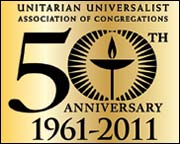UUA leaders begin planning 2012 General Assembly
Planning Committee recommends expanded video coverage of 2011 GA, calls for review of Actions of Immediate Witness.
Leaders of the Unitarian Universalist Association have drafted a statement of purpose for the 2012 “Justice” General Assembly to be held in Phoenix, Ariz.
The team of elected leaders and UUA staff known as GAMAP (General Assembly and the Mission of the Association Partnership) pledged to work with internal and external partners to identify outcomes, provide opportunities for participation by individuals of differing abilities and people with historically marginalized identities, and to use the 2011 General Assembly in Charlotte, N.C., to prepare delegates for the 2012 meeting.
The General Assembly, the annual business meeting of the UUA, voted in June 2010 not to withdraw from Phoenix, where the UUA had already signed hotel contracts for the 2012 GA, despite the adoption of SB 1070, Arizona’s strict new anti-illegal immigration law. Delegates voted to condemn the law, and passed a resolution affirming that the 2012 GA would be focused on supporting immigration reform efforts in Arizona and elsewhere and would include as little denominational business as possible.
GAMAP’s statement of purpose was a first step in organizing the 2012 General Assembly. GAMAP, which was formed around 2003, is comprised of members of the elected GA Planning Committee, the UUA administration, and the UUA Board of Trustees. Its mission is to make sure that the General Assembly’s vision is congruent with the broader goals of the Association, said Jan Sneegas, director of the UUA’s General Assembly and Conference Services office, who is a GAMAP member. “It is a three-pronged partnership,” she added. The group meets once a year prior to the Planning Committee’s September meeting.
At its September 15–19 meeting in Boston, the General Assembly Planning Committee discussed its role in organizing the 2012 GA, made plans for the 2011 GA in Charlotte (where the UUA will celebrate its fiftieth anniversary), gave initial approval to plans to boost the UUA’s capacity to stream live video from the GA plenary hall, and agreed to work with the Board of Trustees and the Commission on Social Witness to research the value of Actions of Immediate Witness, a type of social justice resolution that delegates can introduce during a General Assembly.
The 2011 General Assembly in Charlotte will feature a number of programs marking the UUA’s fiftieth anniversary. Two members of the Planning Committee, who serve on the 50th Anniversary Task Force, which is chaired by the Rev. John Buehrens, minister of First Parish in Needham, Mass., and former UUA president, gave a report. Planned events include a 50th birthday party after the opening celebration, a keynote lecture about Unitarian Universalism’s contribution to the development of liberal religion in America, a worship service examining Unitarian Universalism’s experience as a “blended” family, and a panel reflecting on the UUA’s social justice achievements in the past 50 years.
Recent General Assemblies have offered live streaming video coverage of most plenary events on the UUA’s website. The Planning Committee gave initial approval to a proposal to amplify this service so that it can reach more people. “For the last few years we’ve been cobbling together a system for doing this using borrowed equipment, borrowed software, and volunteers who work 12 to 16 hours at a clip, and paying for a limited amount of bandwidth for the video stream itself,” said Mark Steinwinter, head of the UUA’s Information Technology Services department. “But we recognize that we’re at our limit with what we can do with this methodology. What we want to do is offer a video stream that’s very high quality and very reliable to as many as a few thousand simultaneous viewers, and make it efficient so that our staff and volunteers can get some rest.”
Steinwinter submitted a budget requesting a one-time investment of $14,000 and a recurring budget of $29,000 to the Planning Committee. The proposal will go before the UUA board for approval at its October meeting.
Lynda Shannon Bluestein, chair of the GA Planning Committee, is excited about the possibilities of sharing all events in the plenary hall with a larger audience. “I can’t imagine putting all this [time and energy] into a General Assembly only for people who are there,” she said. “Our purpose is to have a great meeting that can be shared throughout the Association. Our goal is to build a movement where we can share in part the excitement and learnings of General Assembly throughout.”
The Planning Committee also discussed the future of Actions of Immediate Witness, social justice resolutions introduced during a General Assembly by petition. Critics have charged that AIWs should be eliminated because they lack the careful consideration given to Statements of Conscience, which go through a multi-year vetting process by congregations and by the Commission on Social Witness. “AIWs are short shelf-life actions,” Bluestein said. “Plus, they take up a lot of time at General Assembly.” Much of the final plenary session at each GA is dedicated to AIWs and Responsive Resolutions, another kind of social justice resolution initiated at GA.
“We had a leadership understanding with the board that change is needed,” Bluestein said.
The Planning Committee held a telephone conference with David May, chair of the Commission on Social Witness, who agreed that the Commission on Social Witness should form a task force to review the function and value of AIWs. The Commission, a five-person elected committee charged with engaging congregations and individuals in study, action, and reflection on pressing social issues, manages the social witness process that results in Statements of Conscience as well as AIWs.
See sidebar for links to related resources.
Comments powered by Disqus







